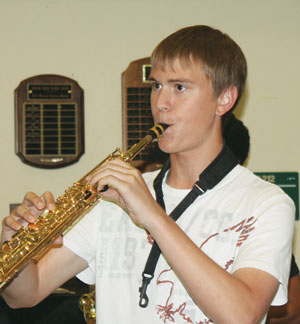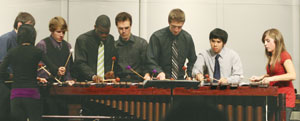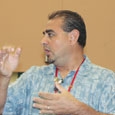 Gabe Musella learned from his earliest years in music that all success depends in part on inspiration from those who came before him. Having learned from great directors, he knew that he wanted to become a teacher himself. He is director of bands at Spring High School in Texas, and his groups have performed at the 2008 Midwest Clinic, the UIL Texas State Marching contest, and the 1995 BOA National Concert Band Festival. Musella’s groups have reached the finals of the TMEA Honor Band Competition four times. He is active as a composer and arranger, and his works have been performed at music festivals throughout the United States and internationally. He earned degrees from Texas Tech University and has three times been honored as a distinguished educator in the Spring ISD.
Gabe Musella learned from his earliest years in music that all success depends in part on inspiration from those who came before him. Having learned from great directors, he knew that he wanted to become a teacher himself. He is director of bands at Spring High School in Texas, and his groups have performed at the 2008 Midwest Clinic, the UIL Texas State Marching contest, and the 1995 BOA National Concert Band Festival. Musella’s groups have reached the finals of the TMEA Honor Band Competition four times. He is active as a composer and arranger, and his works have been performed at music festivals throughout the United States and internationally. He earned degrees from Texas Tech University and has three times been honored as a distinguished educator in the Spring ISD.
Who in your past inspired you to become a music teacher?
If it hadn’t been for my middle school band director, Ram Chavez, I don’t know what I would be doing today. He took me under his wing at a young age. My parents had just split up, and I was feeling a bit lost. He told me, “you have a future in music if you want it,” and he showed me the way. He taught me so much about life and music. I realized that someday I wanted to have that same influence on others.
As a young student I was rough around the edges and had to have my attitude adjusted pretty often. I was a hot shot beginner and moved up quickly from beginning band. I quickly earned all-city honors in Corpus Christi and by the second year of playing I thought I had everything figured out. Then, I showed up at a solo contest that Mr. Chavez was hosting and did not play as well as I had hoped. We talked afterwards about my lack of preparation. From that day forward, I never wanted to step on a stage again and not be prepared.
That attitude continues in my approach as a director. When a performance does not go as expected, I have to look in the mirror and realize that the preparation often was lacking. The key is to give students the correct information on their instruments and prepare them for the type of performance they are facing. Good preparation involves teaching not just notes and rhythms but the mental approach needed, whether the performance is pep band at a game or a solo and ensemble contest.
We have to give students the best chance to succeed but also prepare them to learn from failures. An important emphasis in our program is responsibility. Whether we are in marching season or concert season, we bring students in individually to play their music for us and demonstrate the drill. We stress that you have to keep trying until everything is right, whether it is in music or other school subjects. We tell them that when you write a paper, you need a few drafts; the same is true in band.
What musical goals have helped your program reach such success?
Resonant tone quality is the number one goal. We spend considerable time on tonal fundamentals. With the top group, we can spend anywhere from 40%-60% of rehearsal on fundamentals, and that continues most of the year. There’s never a day when we just play a tuning note and then launch into the music. We follow this approach with every group in the program, including marching band. If you went into our fourth band and asked what the most important thing for them to do would be, they would say play with a characteristic sound. This drives everything we do, including marching band.
What types of exercises do you use to work on fundamentals?
There are several excellent books out there designed specifically for this purpose but we do not use just one. I call our exercises daily drill rather than warming up. Our daily drill includes matching tonal energy, air flow studies, articulation exercises, and careful listening. We do play some Remington exercise with the whole band. With the more advanced groups there is a greater focus on locking in chords and intervals. Throughout my career the exercises I have used have come from the inspiration of many great directors who taught me including Tom Bennett, Eddie Green, Philip Geiger, Rodney Klett, Joe Dixon, and Rick Lambrecht.
What approaches do you use to help students learn to play with a characteristic sound?
The best compliment I can give our students is to praise their openness to constructive criticism from the staff and their peers. I ask frequent questions from the podium about the sound and how it could be improved. The critiques are different depending on the playing level of the group, but even in the fourth band, I encourage students to give critiques of other players. With the young students it is really cool to watch their eyes light up as they develop the skills to hear playing weaknesses and make improvements.
I make it clear from the beginning that all critiques must be done in a constructive way without belittling anyone. The rehearsal room has to be a safe, comfortable environment at all times. I will ask leading questions about missed notes or whatever to steer the discussion. It works well to have one student play and then ask for comments from the rest of the band, but the director has to make sure that there is no personal vendetta or hurtful criticism of players. As we work on music and make suggestions for improvement, there is always a bit of the coach in me. If you make a suggestion about someone else’s playing, I might put you on the spot and see how you would play the same passage. In a friendly environment, this approach works well.
What role do chamber ensembles play in your program?
I love working on chamber groups; it is my favorite time of the year. We get to play music by composers not often associated with band literature. In any performance with more than one player, there is an amazing level of collaboration and non-verbal communication. If I want to play a duet with someone, I have to be aware of every aspect of their playing to make my part fit correctly. Chamber ensembles offer an opportunity to play music from periods and composers that are rarely encountered in typical band music. Students are forced to think carefully about the melody, secondary parts, and how these fit together. This type of awareness produces significant benefits when students then play in full band rehearsals. In large ensembles and small, the focus remains on producing the best possible tone.
I wish we could have chamber ensembles all year but the reality is that the schedule is just too busy. Every year there are some ensembles that get started early in the winter. Christmas music in December often provides a jump start for chamber groups. We typically hold an ensemble festival in February. For many years our percussion group has continued playing into the spring and we usually have a separate concert with the percussion ensemble and jazz band.

The Spring Percussion Ensemble under former percussion coordinator Rick Rodriguez performed at the Midwest Clinic in 2009. Rodriguez, after 17 years at Spring, now teaches at Cedar Ridge High School in Round Rock, Texas.
How do the skills learned in music help your students in the rest of their coursework?
When students always strive for their best effort, it can become a way of life. In Texas we have No Pass, No Play rules that make some students ineligible to participate in sports or music if their grades are not high enough. We have some very bright students in our programs, but also some who struggle a bit in school. Once they begin to thrive in music they think, “Okay, I’m this kind of student in band, I have to do the same in math or English.”
Setting high goals is an important part of the program. I remind students weekly that I don’t care about winning trophies. I care about developing students who are good human beings with a sense of pride for their work. I remind them that when the Houston Symphony performs, there is no trophy waiting at the end of the concert. Reaching a high level of excellence in the music is more fulfilling than any trophy.
We have an active group of student leaders in our program who provide invaluable assistance both in rehearsals and in planning social events. At the start of the year I will have these leaders write down three goals for themselves and the group. It’s quite revealing to see the different goals ranging from wanting to make all-state band to helping the band improve. These goals make students feel connected to the success of the program.
Often, student leaders take responsibility for teaching fundamentals to the younger players. Sometimes, we will say to them “section leaders you have five minutes to make your sections play this better.” I remind students that the directors aren’t going to mark to your spot on the field and play the music for you.
 How many of your students take private lessons?
How many of your students take private lessons?
Every player in our top group takes private lessons, and all students participate in masterclasses with our excellent staff of private teachers. Because of our proximity to Houston, we have many private teachers who regularly substitute with the top orchestras in Houston. I realize it is not the norm in some places, but our students do not have to go far to hear characteristic tone. Our masterclasses occur during the school day about 20 times a year.
How difficult is it to get students to appreciate band music that they may not like at first?
Our older students in the program have been exposed to a wide variety of music. That is the key. Sometimes with unfamiliar music, you have to warn students to give the music a chance. Music for Prague is a great example of a piece that took some time to appreciate. At first students were a bit baffled by the music but now I still have students come up to me to say how much they loved the experience. I was particularly surprised to hear from parents who said that Prague was their favorite piece from the last five years. Part of that appreciation comes from taking the time to educate the students and audience about the music and the events surrounding its creation.
As a director who is also a composer, how do you approach musical interpretation?
With every piece of music you start with the somewhat ambiguous goal of producing a performance that matches the composer’s intent. This means that you shape the ensemble sound in dramatically different ways depending on the music. Our recent performance of Copland’s Appalachian Spring had a very transparent texture compared with Frank Ticheli’s Blue Shades. This year my top band is a true wind ensemble anchored by the first chair tubist in the state of Texas. I never have to worry about him holding up the band. I have programmed in a way that best flatters this small group, but there are some pieces that really work best with a larger band.
Over the years, my groups have tended toward the smaller side although I do have experience with larger groups. When I studied for my master’s degree with Jim Sudduth at Texas Tech University, he directed a true symphonic band with about 65 members. I learned a lot from him about how to conduct that type of group well.
How did you get started in composing?
I started composing because my junior high director was an arranger, and I thought it was cool. I grew up at the time the Maynard Ferguson version of the Rocky theme was all over the radio, and one week Mr. Chavez came into school after staying up all night writing an arrangement of the music for the band. At first I just dabbled as a composer. By the time I made it to high school and joined the show choir, I started writing horn charts to accompany the group. I also had a small jazz combo, and we even played a wedding when I was in high school. Then, I went to Del Mar College and took some composition classes.
I have been lucky in my composing. After publishing my first work in 1990, I didn’t publish another work until 2001 called McKamy Variations. That piece received a reviewer’s choice rating from The Instrumentalist and I was really excited about that. Since then I’ve written for all different types of ensembles – strings, clarinet choir, concert band, and percussion ensemble. I try to take a different approach with every piece. My use of harmony may be the same in some pieces, but I don’t want to write the same piece 25 times.
How does your booster organization contribute to the program?
One of the beautiful things about Spring High School is the high amount of parental involvement, even from parents who haven’t had children in the program for over ten years. Our boosters take great pride in helping us with so many things. We have a band mom, Reni Stowell, who handles our band uniforms and she and her crew do such a good job that I know not one thing about their procedures. They hand out the uniforms, take care of cleaning and repairs, and sew up the hems as necessary. We have a long cultivated tradition of volunteerism with the band program that developed under the great directors who came before me. The voice of the Spring band, Fred Dickinson, announces all of our events and his last child graduated in 2001. To get parents to stay that long, I try to thank them at every turn.





